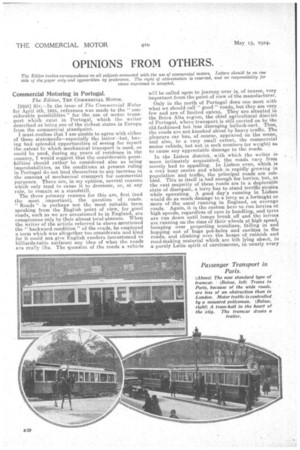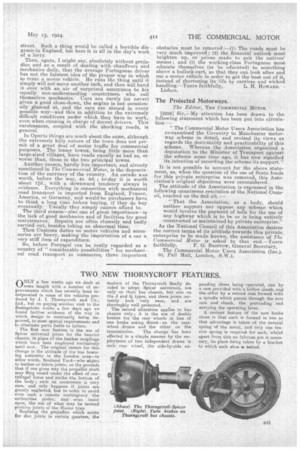OPINIONS FROM OTHERS.
Page 24

Page 25

If you've noticed an error in this article please click here to report it so we can fix it.
The Editor invites correspondence on all subjects connected with the use of commercial motors. Letters should be on one side of the paper only and typewritten by preference. The right of abbreviation is reserved, and no responsibility for views expressed is accepted.
Commercial Motoring in Portugal.
The Editor, THE COMMERCIAL MOTOR.
12258] Sir,—In the issue of The Commercial Motor for April sth, 1924, reference was made to the " considerable possibilities" for the .use of motor transport which exist in Portugal, which the writer described as being one of the richest states in Europe from the commercial standpoint. I must confess that I am unable to agree with either of these statemenfs—especially the latter—but, having had splendid opportunities of seeing for myself the extent to which mechanical transport is used, or could be used, during my years of residence in the country, I would suggest that the considerable possibilities should rather be considered also as being improbabilities, as the conditions at present ruling in Portugal do not lend themselves to any increase in the amount of mechanical transport for commercial purposes. There are, in my opinion, several reasons which only tend to cause it to decrease, or, at any rate, to remain at a standstill.
The three .primary reasons for this are, first (and the most important), the question of roads. " Roads " is perhaps not the most suitable term speaking from the English paint of view, for good roads, such as we are accustomed to in England, are conspicuous only by their almost total absence. When the writer of the article referred to above mentioned the " backward condition" of the roads, he employed a term which was altogether too considerate and kind for it could not give English readers (accustomed to billiards-table surfaces) any idea of what the roads are really like. The question of the roads a vehicle
will be called upon to journey over is, of course, very important from the point of vie* of the manufacturer.
Only in the north of Portugal does one meet with what we should call " good" roads, but they are very few and are of limited extent. They are situated in the Beira Alta, region, the chief, agricultural district of Portugal, where transport is still carried on by the old-fashioned but less damaging bullock-cart. Thus, the roads are not knocked about by heavy traffic. The pleasure ear has, of .course, appeared on the scene, and also, to a very small extent, the commercial motor vehicle, but not in such numbers (or weight) as to cause any appreciable damage to the roads.
In the Lisbon district, with which the writer is more intimately acquainted, the roads vary from merely bad to appalling. In Lisbon even, which is a very busy centre and which is rapidly growing in population and traffic, the principal roads are cobbled. This in itself is bad enough for lorries, but, as the vast majority of these roads are in a deplorable state of disrepair, a lorry has to stand terrific strains while operating. A good day's running in Lisbon would do as much damage to a lorry as a fortnight or more of the usual running in England, on average roads. Again, it is the custom here to run lorries at high speeds, regardless of care in handling, and tyres are run down until lumps break off and the lorries are running on the rims of their wheels at high speed, bumping over projecting tramlines, 'falling in and hopping out of huge pot-holes and cavities in the roads, and climbing over the heaps of rubbish and road-making material which are left lying about, in a purely Latin spirit of carelessness, in nearly every street. Such a thing would be called a horrible disgrace in England, but here it is all in the day's work of a lorry.
Then, again, I might say, absolutely without prejudice and as a result of dealing with chauffeurs and mechanics daily, that the average Portuguese driver has not the faintest idea of the proper way in which to treat a motor vehicle. He runs the thing until it simply will not move another inch, and then will hand it over with an air of surprised annoyance to his equally non-understanding countrymen who call themselves mechanics. Cars are rarely (or never) given a good clean-down, the engine is but occasionally glanced at, and the cars are abused in every possible way—and this in addition to the extremely difficult conditions under which they have to work, even when running in charge of decent drivers. This carelessness, coupled with the shocking roads, is general.
In Oporto things are much about the same, although the extremely hilly nature of the town does not per mit of a great deal of motor traffic for commercial purposes. The lesser towns, being little more than large-sized villages, have roads equally as bad as, or worse than, those in the two principal towns.
Another reason, hardly less important, and already mentioned in The Commercial Motor, is the deprecia
tion of the currency of the country. An escudo was worth, before the war, 4s. sd. ; to-day it is worth about 10., with a downward tendency always in
evidence. Everything in connection with mechanical road transport is imported from England, France, America, or Germany, and would-be purchasers have to think a long time before buying, if they do buy eventually. Usually they simply cannot afford to.
The third reason—also one of great importance—is the lack of good mechanics and of facilities for good maintenance. Repairs are often clumsily and badly carried out, besides taking an abnormal time.
Then Customs duties on motor vehicles and accessories are heavy, making the importation of a, car a very stiff item of expenditure.
So, before Portugal can be really regarded as a country of "considerable possibilities" for mechanical road transport in commerce, three important obstacles must be removed :—(1) The roads must be very much improved ; (2) the financial outlook Tust brighten up, or prices made to suit the natives' means ; and (3) the working-class Portuguese must educate themselves (or be educated) to something above a bullock-cart, so that they can look after and use a motor vehicle in order to get the best out of it, instead of shortening its life by careless and wicked handling.—Yours faithfully, L. H. HOWARD. Lisbon.
The Projected Motorways.
The Editor, THE COMMERCIAL MOTOR.
[2259] Sir,—My attention has been drawn to the following statement which has been put into circulation:—
"The Commercial Motor Users Association has re-examined the Coventry to Manchester motorway scheme in detail, and revised its views as regards the desirability and practicability of this scheme. Whereas the Association organized a, deputation to the Minister of Transport against the scheme some time ago, it has now signified , its intention of according the scheme its support."
It is not possible to account for the above statement, as, when the question of the use of State funds for this private enterprise was removed, this AsSociation's original Objections were reconsidered.
The attitude of the Association is expressed in the following unanimous resolution of the National Council, reached on the 2nd ult. :— • "That the Association, as a body, should neither support nor oppose any scheme which
• would involve the payment of tolls for the use of any highway which is to be or is being entirely constructed or maintained by private enterprise." As the National Council of this Association desires the correct terms of its attitude towards this private enterprise to he made known, the assistance of The Commercial Motor is asked to that end.—Yours
faithfully, F. G. BRISTOW, General Secretary, • The Commercial Motor Users Association (Inc.). 50, Pall Mall, London, S.W.1.




























